Rewatch in the reread time, everyone! Look out!
Now… what of Chris Columbus’ second (and final) foray into the Potter universe? Well, for one, I had forgotten how long it was. A film for the little ones that easily goes for two-and-a-half hours? What world is this? The answer, of course, is a world obsessed with Harry Potter. This film came out after Goblet of Fire was published, and Hogwarts Mania was firmly in the zeitgeist.
The movie is a mixed bag for sure, but it’s better than I remembered. I think it helps having some distance on these babies—now that the hype is no longer present, there’s less riding on these films being the best that they can possibly be.
So much of the book is packed into this film, you think at times it might explode. On the other hand, it flows alarmingly well. I think this is mostly a testament to how tight the story is all by itself. It might be a bore to some people, but for fans, it’s nice that they linger on sets and aspects we haven’t encountered yet. They knew that people didn’t want to miss out for the sake of a shorter film.
Biggest mistake in the film is not including Lucius and Arthur’s epic dad fight. Trade the dumb action-y bit with the Ford Anglia and give me the dad fight. DAD FIGHT.
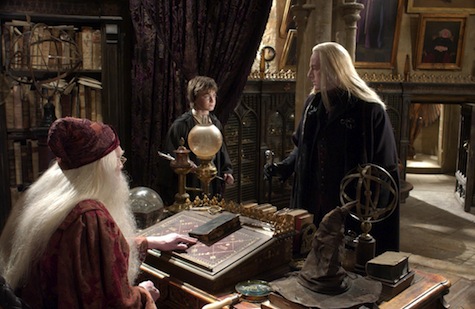
That’s a lie, though, of course. The film makes more than a few missteps, one of the primary ones being the continued choice to relegate Ron to comic relief and Hermione to SuperWonderGirl. I understand that Kloves likely felt as though his scripts were playing to the kids’ strengths as young actors, but no one is doing Rupert Grint a favor by never giving him meatier material. In addition, a lot of the line swaps don’t make sense; for example, Hermione’s hurt over being called a Mudblood. In the book, she is rightly baffled—how can a curse word you’ve never heard hurt your feelings? Ron is offended on her behalf and explains it all to Harry because he knows what the word means. He knows why it’s wrong. Instead we’ve got tears glistening in Emma Watson’s eyes and Hagrid’s heartfelt reassurances.
It’s aggravating because it’s actually damaging to Hermione’s character as well. The scripting choices recast her as the group’s heart (in addition to being its brain), which is a typical role played by practically every female character in a group of boys. That wasn’t how it worked in Potter. Harry was the nerve, Hermione was the brain, Ron was the heart. The dynamic was interesting because it was fresh. It is nice that Hermione gets a little added screen time, seeing as she’s is benched for a good portion of the tale, but there were smarter ways it could have been done.
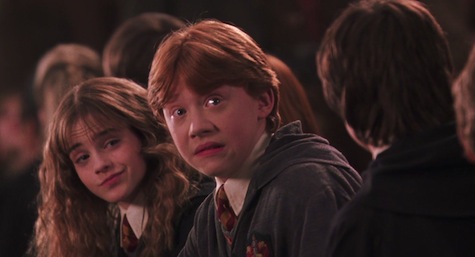
Equally important is this movie’s choice to sideline a character who is perpetually disrespected in all the Potter films—Ginny Weasley. It’s less important here, I’d argue, but the result makes for a weaker mystery this time around. Because the film spends next-to-zero time giving Ginny any focus (there are one or two shots of her looking grumpy for all our trouble), the reveal that she opened the Chamber of Secrets falls flat. It’s a surprise because it genuinely is surprising, which is wrong. Most of the fun in Potter mysteries was that moment of ‘aha’ when all the little clues came together, when you felt a little dumb for not piecing the puzzle out fast enough. There are practically no clues in this film, no indication through the narrative. I don’t think it’s the only Potter film to have this problem, either, but we’ll hit on that later.
On the technique front, it turns out that Columbus switched to handheld cameras for the second film, wanting the freedom to move. As a result, sometimes he moves too much. The scene where Riddle is talking to Harry in the Chamber is marred by the camera swerving around him as he speaks practically the entire time. Stay still, camera. Camera, stop. Camera, no. (Also, he lights Lucius Malfoy so strangely at the end of the film. The old “highlight just the eyes” trick. Just a strip of light across his face. So goofy.)
Ron, your voice is dropping! Everyone’s voice is dropping! This is one of the toughest things about filming with child actors over a long period of time. There are hilarious and unavoidable technical flubs in this film, points where it’s clear that they had Radcliffe go back and dub over a line after shooting and his voice is considerably lower. In some ways, it adds to the magic, that lack of polish. The special effects are alarmingly out of date in places, and it hasn’t really been that long—shots where the car or those flapping Quidditch robes really stand out. And the places where they chose to nix the CGI are a welcome departure, such as the live puppet version of Fawkes. He’s just so gentle and wise-looking. I wanna cuddle him.
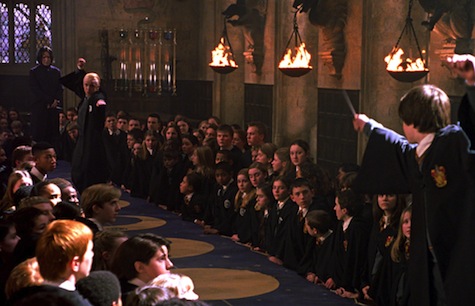
Weird aside: the lack of new music in this soundtrack is frankly jarring. There are a couple new themes (Fawkes’ music is gorgeous and the Chamber’s music is wonderfully ominous), but aside from that, too much of it is ripped exactly from the first movie. It seems pretty obvious what happened; John Williams was working on this film and Star Wars: Episode II at the same time, and I think completing two completely new scores was too tall of an order. Attack of the Clones suffers similarly; a lot of its random incidental music is pulled verbatim from Phantom Menace. He’s back on form for the next soundtrack, so at least he wasn’t simply bored with the material.
It sounds like I’m overall unhappy with this movie, doesn’t it? I’m not really, not at all. It makes for a thoroughly enjoyable viewing experience. The kids are already exponentially better at inhabiting their roles, and it makes this movie so much more fun than the first. There are still cardboard moments strewn throughout, but Radcliffe’s sass level is at 10 through the entire film. His comic deliveries (“I think we found the train.” “Thank you. We’ll just… go.”) are not only a highlight, but endear you to Harry as a character in a way that the books sometimes fail to do. After all, in the books Harry is more of an audience avatar. On film, he has to be his own person. Then there’s Rupert Grint—though he is only permitted slapstick reaction shots, he handles them like a pro. Emma Watson is already showing a depth that will soon morph into some real chops. (I don’t understand why they crimped her hair, though. It’s just weird.) Tom Felton is hilarious as Draco on Round 2, though someone seems to have given him instructions to over-pronounce every line.
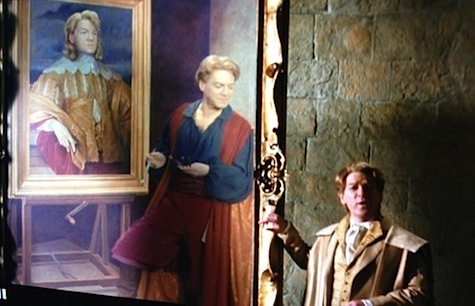
Hugh Grant was in running at the start, but the casting of Kenneth Branagh as Gilderoy Lockhart is a stroke of genius that can only be compared to the genius that is his wardrobe. His high-waisted dueling slacks rule my world. There’s really not much more that needs saying, unless we want to talk about his painting of himself painting himself, which I will talk about forever because it was one of the most perfect set dressing decisions ever made in the history of film.
Jason Isaacs is a similarly perfect piece of casting and famously adored his role. I do have to agree that his final shot at Harry in the film is an undermining of his character, though. The fact that they suggest that Lucius Malfoy would be willing to murder Harry Potter (he raises his wand and utters the beginning of the Killing Curse) in broad daylight at Hogwarts is at odds with everything we know about the guy. Just an odd, wrong choice. And then we have Richard Harris’ final turn as Dumbledore. He offers some incredible silent takes in reaction to others, but knowing that Harris died shortly after this, it’s hard not to feel as though he is losing steam throughout the film. It’s sad to remember that we only got two of these movies with him, even if he wasn’t keen on doing them in the first place. (He only agreed because his granddaughter insisted he take the role.)
But the real clunker that stands out here is obviously the film’s ending. Hagrid is delivered back from prison, gives a big thank you to the trio for proving his innocence, Harry has to utter a stilted “there’s no Hogwarts without you, Hagrid,” and the majority of the school rises to applaud. It is one of the most awkward bookends on a film… ever? Probably ever. You can tell that Radcliffe has no idea how to deliver the line, that no one really knows what they’re celebrating. And what’s more, we have not been emotionally set up in the film to worry much about Hagrid, so the sudden sharp focus on him is plain strange. The film treats his imprisonment similarly to the book—he’s sent away, then he’s back. Hooray! The only thing I can figure is that Kloves made the mistake of operating on the other books in the series; in book three, we find out that being sent to Azkaban is nothing like spending a few weeks in a federal penitentiary. It’s basically torture.
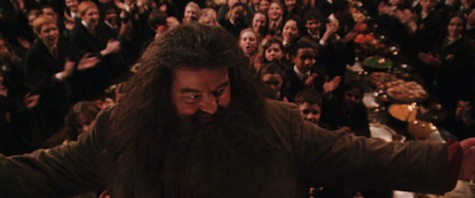
Knowing that, perhaps he wanted to make more of a deal out of Hagrid’s return, give him the hero’s welcome he deserved for going through something so terrible. But the film does not make any move toward indicating just how bad Azkaban is, so the scene still doesn’t play. It’s just overly sappy and un-earned.
So… that’s sort of a problem. But otherwise, it’s a perfectly fun movie!
Next up is arguably the most artistic of the Potter films. It’s also one of the most problematic, in my opinion. But we’ve got a whole book to get through before we hit that….
Emmet Asher-Perrin does love that Fawkes theme, though. You can bug her on Twitter and read more of her work here and elsewhere.










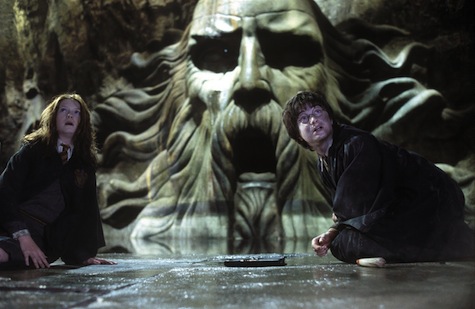
I remember going into this film having already read the books so far, and as POA was my favorite at the time (and mostly still is) I remember thinking that this was a film that I have to “get through” in order to get to POA. So it felt rather like a placeholder film.
Honestly I thought the first two books were charming books, and only got into them once my then-girlfriend mentioned that there were children’s books that were charging up the best seller lists (remember that, when they didn’t have a second list?- thank JK for that).
It was POA that changed my thought from “Cute little books” to “this is an epic generation-spanning saga” so I really didn’t think much of this at the time- not realizing home much of this book would come to inform the rest of the story
the adaptation of the book here, it put in so many of the little parts of the book, while completely ignoring major plot points, like Ginny being present at all, like Lockhart calmly asserting after every attack that the danger was gone (which really shows his incompetence more) If I had to teach a class on adapting fiction to the screen (which sounds like a fun job actually) I would show this film as an example of what not to do.
This is so much the weakest film, I know people who haven’t seen 3-8 because they saw this one and decided it wasn’t for them.
I actually didn’t enjoy the film much. I’ve never felt that the film versions were as good as the books, but the first one did a remarkable job of imparting the same sense of wonder and humor as the book did. This one fell flat, for all the reasons you mentioned, Emily. It had its moments, but there were so many moments when I wasn’t just jolted by changes from the book, but by things totally inconsistent with the world of Harry Potter (Lucius Malfoy muttering “Avada…” in a growl is the most startling example of this, as you pointed out.) And the change in dynamics, with Ron being the least of the 3 friends in all aspects was just wrong, as you stated. Though this may have something to do with the brilliance of the other 2 actors, which becomes more apparent as they mature, rather than a desire to shunt Ron’s presence away (sorry to Mr. Grint, but it’s true that Radcliffe and Watson demonstrated their talent from the beginning, and thus deserved to get the brunt of the cinematic focus).
I always liked Harris as Dumbledore, and find it jarring when we have a new actor in the next film. I know it was necessary, given Harris’ unfortunate death, but Michael Gambon just never looked right to me for the part.
I’m in general agreement here with most everybody. Most especially the decision to dumb Ron down. Rupert Grint may have developed more slowly as an actor than the others, but they really never give him a chance to do anything. When he finally gets to show some real emotions in DH, it feels weird, because we’ve never seen any depth from him before. His fear of the spiders is really well done in this film, though. When he squeaks “Harry” and points up is just terrific.
My guess as to why they crimped Emma Watson’s hair is that there were complaints about her hair in the first film. Hermione is described as having bushy hair, and this might have been a response to that criticism.
I really can’t imagine anyone other than Branagh as Lockheart. By all accounts, there’s a bit of Lockheart about him in real life. There’s something too self-effacing about Hugh Grant for him to pull off the role.
One way they could have better shown the serious effects of Azkaban would be to have Harry & Co. notice Hagrid quietly sneaking in to the teacher’s table, sitting, and looking down at his hands without any sign that he’s glad to be back–the experience was so harrowing and still fresh.
Completely disagree about the Hagrid ending.
I hadn’t read the books by this point, when I first saw it, so that moment really spoke to me. Without that moment, Hagrid just the wierd hairy guy that only Harry and his friends associate with. That moment speaks to the fact that Hagrid is much a fixture at the school as Whomping Willow and Great Hall ceiling. That not just HRH find value in him, but that a lot of the students do value Hagrid.
That needed to be established, because by GOF I would have been worried for Hagrid when his parentage is revealed. The books themselves should not have waited that long to establish how much Hagrid was LOVED by the students at Hogwarts.
I loved your look at this film. I agree with you about the next movie, it is brilliant in it’s presentation of the HP world, but it’s telling of the story is seriously flawed.
No one has mentioned this yet, and so I almost fear to do so in case it’s not true, but since it has come up multiple times…
I have heard (and I cannot remember where) that Jason Isaacs improvised the Avada Kedavra line, as the only direction he got was to “start muttering a spell” and that’s the only one that he could remember at the time. I thought that came from an interview with Isaacs, but don’t quote me.
I enjoyed the screen depiction of the events in the Chamber of Secrets. Particularly when Tom Riddle explains how is is draining Ginny’s life force and Riddle is the teenage version of the “man” who will become Lord Voldermort. I also enjoyed Harry’s stabbing of the diary.
Thanks for reading my musings,
AndrewB
For the most part I liked the movie… Lots of funny moments and Branaugh nails the part of Lockhart. I also really liked how they did the sink and chamber of secret doors opening in response to Harry’s parsletongue. My complaint is Dobby. I though he was a bit too cartoonish. I also remember being underwhelmed by the sword of Gryffindor… I expected something more somehow (bigger more, magical looking maybe… I am not sure). It looks too much like a glorified letter opener IMHO.
@10, that’s a good point, prop-wise. The sword sure doesn’t look much like a useful weapon forged in the 11th century. It’s as if Gryffindor went to the goblins and said, “I don’t want a real magic sword for killing people and monsters, I want more of a 3/4 size trophy sword that I can hang on the wall and pass down to my heirs. “
@Aeryl – You know, I totally agree in context, but not in execution. It’s true, it takes too long to make it clear how important Hagrid is, even in the books. But having that as the final scene is confusing from a narrative standpoint. It makes it seem as though Hagrid was meant to be the entire focus of the film, when he’s not. In fact, the movie does a worse job than the book when pointing out how Riddle’s opening of the Chamber ruined Hagrid’s life as a wizard.
We get none of the reflection that Harry has internally throughout the book – it’s another place where the lack of mystery messes with the movie. Part of the reason that Hagrid’s throughline in the book is so tragic is because everyone (the reader included) is given reason to suspect him when he did nothing. If they’d added some dialogue about how bad the prison was, suggested that the kids were worried about him, even placed that homecoming a bit earlier in the film, I think it would have read better.
@Rich B and StrongDreams – That sword is surpremely awkward. My assumption was they simply wanted the sword to be Harry-sized and built it accordingly. A broadsword from the time the Gryffindor lived would have been nearly as long as Harry was tall, so it makes sense that they thought it needed to shrink. But they went way too far in the other direction, so it really does look decorative rather than fuctional. Also, Harry picks it up by the blade in Dumbledore’s office, which caused a systems failure in my brain when I was watching this time around.
Now I so want to read a review of Prisoner of Azkaban, because it is my personal favourite of the seven Potter movies. I loved the movie, despite its plot inconsistencies.
I was disappointed when Cuaron didn’t turn up to direct the final two installments.
But I guess more of that would come here later.
@6–I’m pretty sure that the rest of the kids at school -don’t- care about Hagrid, though. I always got the impression that while Hagrid was beloved by the trio and a father figure to Harry, most of the school did think he was kind of weird. When he disappears in GOF, most of the people are super happy to have Professor Grubbly-Plank as a teacher. Of course, you’re right that there’s a huge outpouring of support from former students when his parentage comes out in GOF, so maybe I’m forgetting some times in the book when other students do show him support. This is a long way around of saying that I found that ending scene super jarring as well–but because of my book purism, not because of how well (or not) it fit in the movie.
@10, 11
Allegedly, it was made for goblin use, not human.
@14, I had the same thoughts – I didn’t get the impression any of the other students were particularly close to Hagrid. They weren’t as disdaining of him as Malfoy and his ilk were, but you don’t hear much about him socializing with any other students. I do agree he’s a fixture at Hogwarts, though.
This is probably my least favorite of the movies…I just can’t stand Rupert Grint’s rubber face (my husband and I make fun of it all the time) – I like him in the other movies, but he seriously irritates me in this one, for the various reasons Emily has mentioned. Also, I hate the stupid ‘almost falling out of the flying car’ stuff.
In the movie, they still had to keep their own voices when they took Polyjuice Potion, right? Or am I getting that backwards?
I still enjoy the movie (especially any scene where Snape and Lockhart are on screen together) but overall this one falls a little flat. I do remember really liking the end though, but because of the scene where all 3 friends were together at the end…it made me feel kind of warm and fuzzy.
@14, Ginny, Fred, George and Lee all express a great deal of affection for Hagrid.
No one, not even HRH, likes him as a teacher(and I’ll never forgive them for hating on him about the Skrewts, when he obviously bred those for the maze at Dumbledore’s request), but apart from a teacher, I never saw anything but affection from the students.
@Aeryl–Ah yeah, the Weasley kids are definitely fond of him (Charlie too), but I always read that as the exception rather than the rule. But that’s a good point about them hating on him as a teacher, not as a person. That’s very nice to realize! I’ve always felt a bit bad for him.
A common complaint about teachers is that they can only teach, not do. It could be argued that Hagrid can do, not teach (there is no one in the Wizarding world that I would want more to help handle/take care of magical beasts, but Hagrid’s teaching methods ARE somewhat suspect).
@15, no, it was commissioned by Gryffindor and the goblins made it for him. Hence his engraved name, among other things. (It’s just that under goblins’ concept of ownership, they view him more as a lessee, and the sword belong to them on his death.)
(For that matter, I don’t think 11th century sword makers engraved the name of the owner on the sword anyway. They would engrave the name of the sword, or of some god or mythological figure, but not the owner. Otherwise, Glamdring and Orcrist would be named Thingol.)
(Speaking of concepts of ownership, its funny that after 900 years, the goblins never figured out that the sword was tied to the school and to Gryffidor house more deeply than their concept of ownership permitted them to acknowledge. Apparently they never thought to ask the sword to whom it thought it belonged.)
@20, It had another owner prior to Gryffindor, it’s in Deathly Hallows, Griphook talks about the goblin who owned it, who he killed with it, and that Gryffindor took it from them.
I don’t disagree that the sword at that point decided it belonged to Gryffindor more than the goblins(much like a wand would switch allegiance), but we’ve never once been provided with information that Griphook was lying or misleading when he informed HRH of that.
Wait, what? The sword had prior owners? I guess I need to re-read DH. But that creates problems too. Who engraved Gryffindor’s name? Surely not the goblins, but since the sword can not be marred and only takes in what makes it stronger, then who? Doesn’t seem entirely well thought out.
@21 Aeryl- the sword was made on commission for Gryffindor, and afterward the goblin who made it (Ragnuk) tried to steal it back but the goblins he sent were defeated. It’s been stated by JKR:
“Gryffindor did not ‘steal’ the sword, not unless you are a goblin fanatic and believe that all goblin-made objects really belong to the maker”. Accio-quote.org. 30 July 2007. Retrieved 25 November 2011.
I saw the CoS film before I read the books. It remains my favorite of the Harry Potter films to me (though watching it over and over when I was little owes a lot to that regard).
Do any of you go to Mugglenet.com. That site’s got some very good features (that Caption Contest is freakun’ hilarious!).
Anyway, I’ll still be around when we do the reread of Prisoner of Azkaban with more Owlay’s Spot. And I expect that this time the reread will be more popular with the pages having the same number of comments as in the Read of ASOIAF, and also that the discussions will remain active through the weekend, since I’ve felt that all of you haven’t answered my comments satisfactorily so far. This time I’ll try to make them somewhat easier to answer to.
Sincerely, Owlay
@20: Yeah, an 11th century swordsmith was probably more inclined to mark a sword with his own name than the owner’s – cf. e.g. the Ulfberht swords.
@24, I find your questions interesting, but many of the things you bring up aren’t that relevant to me and my reading of the books, like your constant questioning about suspecting Percy, who I pretty much wrote off back in the first, and I already knew how this ended when I read the books. I do try to answer the questions that engage me.
There’s a fellow at Buzzfeed watching the films for the first time; he live tweets his watching experiences, and seeing his reactions while going through the reread is hilarious.
Completely agree with the Ron/Hermione mudblood thing.
I think the reason the Hagrid moment is so jarring/cheesy is that literally the entire school (apart from Malfoy & co) is cheering. Even Snape’s on his feet. And Hagrid is just not popular enough for 98% of the school to forget their delicious dinner and crowd round clapping for an extended period of time.
And just as an aside, where on earth did Ginny get all that blood for the wall???
@28, The roosters
@24 I appreciate you asking the questions. I just don’t usually feel like answering them, but by all means keep asking. Sometimes they can bring up some fun nuggets to think about.
CoS works much better as a film than does PS/SS for the same reasons many other movie-franchise sequels surpass the originals: since less time is required for world building and character introductions, more time is available for plot and character development. The end result flows better, has more even pacing, and feels more coherent.
The length of this book also is well-matched to the standard running time of feature films so the various revisions and omissions feel like the usual book-to-screen tradeoffs seen in other stories rather than major deviations. (Except for the portrayals of Ginny and Ron, those were just the screenwriters not understanding the characters).